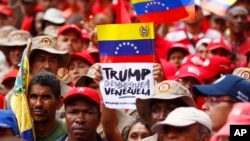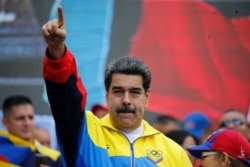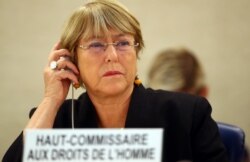In a speech to the U.N. human rights council, Venezuela’s foreign minister has blasted U.S. sanctions imposed on the government of Nicolas Maduro as economic terrorism designed to bring his country to its knees.
The United States wants to see Maduro leave power and is among more than 50 countries which have recognized opposition leader Juan Guaido as Venezuela's interim leader.
Venezuela’s Foreign Minister, Jorge Arreaza Montserrat, says there is widespread agreement that unilateral coercive measures have a negative impact and should not be used.
He cites a resolution recently adopted by the non-aligned movement urging States to refrain from applying unilateral coercive measures. He says this position is backed by the UN General Assembly, the Office of the High Commissioner for Human Rights, and the Special Rapporteur on the negative impact of unilateral coercive measures, Idriss Jazairy.
And, yet, he says the United States continues to impose such measures on his country, asserting the U.S. has no moral grounds for doing so. He speaks through an interpreter.
“The goal is crystal clear — to bring the Venezuelan economy to its knees and to prevent the Government from meeting the basic needs of its people as well as to bring about a change of government by unconstitutional means through the use of force…There have been attempts to use humanitarian aid as a weapon against Venezuelan sovereignty.”
Montserrat says the sanctions make it impossible for Venezuela to buy basic food, drugs, medical equipment and other essential goods. He says it is the poorest, most vulnerable members of society who suffer most from this deprivation.
Last month, the Trump Administration announced harsh new measures against the Maduro government. It ordered a freeze on all Venezuelan government assets in the U.S. and barred transactions with the authorities.
U.S. officials said these measures would have no effect on the citizens or private companies.
However, this view was disputed by U.N. rights chief, Michelle Bachelet in a report she presented to the U.N. Council this week. She said the reduction of public revenues and decrease in oil revenues was already having a serious impact on social programs and the population generally in Venezuela.
She warned people would continue to flee in droves if the harsh socio-economic conditions in the country persist.
Venezuela's economic woes predate U.S. sanctions. The country's drop in oil output began under former President Hugo Chavez, Maduro's predecessor. For years, opposition groups accused both Chavez and Maduro of gross economic mismanagement.
The U.N. refugee agency reports there are more than 4.3 million Venezuelan refugees and migrants worldwide, making them one of the single largest population groups displaced from their country.






